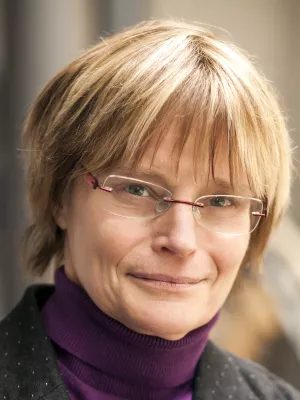
Karin Jonnergård
Professor emerita

Developing a Code of Ethics for the Swedish audit profession 1923 to 1994 - Juxtaposing the internal and external role of the Code
Author
Summary, in English
The paper presents an analysis of context within which FAR, the Swedish professional association representing accountants has developed and revised the Code of Ethics from 1923 to 1995. The purpose is to enhance our understanding of the choices made as to what ethical rules were verbalized or codified and the motivations behind the codification.
Building on Birkett and Evans’ (2005) model for organizing and understanding histories of the professionalizing activities of occupational associations of accountants and Abbotts view of professional codes, a theoretical framework has been constructed to analyze the circumstances and sequence of events that have had an influence on codification of ethics. The findings is based on content analysis of the Code of ethics and an extensive review of archival documents from FAR, legislation and previous studies on the development of the profession in Sweden.
The findings have been analyzed in three phases depicting the development of the profession as the state shifts from an industrial to a neoliberal state. The phases are:
Phase 1 A newly established Gentlemen’s club (1923-1932)
Phase 2 Professionalization of auditors (1933-1976)
Phase 3 Internationalization of the audit profession (1977-1995)
The analysis shows how the Code of Ethics has been verbalized within the context of shifting ideologies of government and governance of both the state and profession in an increasingly interconnected and interdependent world. Ethical codes are context sensitive. Differing from Anglo Saxon studies; this study is set in the Swedish context where the state and profession have co-developed over time. The code has been codified in a changing regulatory landscape where public and private actors occupy the audit regulatory arena and the ethics of the profession is regulated by a complex interplay of legislation and by laws, international, regional and FAR’s codes of ethics governing professional conduct. In 1923, when FAR was established, the rules of professional conduct were not explicitly codified. Rather, the expected conduct of a member was socialized through initiation and other meetings, social networks and education. The professionalization of auditors, growth and heterogeneity of FARs’ members, the financial scandals, the economic and regulatory developments have led to an increasing need to verbalize and publish the Code of Ethics for the profession. The power to verbalizing the ethical rules has changed over time and with time the profession gained an increasing power over determining the content of its ethical code. The Code serves not only to legitimize the activities of the audit profession to regulators and other important stakeholders but importantly, it acts at the same time as a remedy for association control, juxtaposing the internal and external role of the Code.
Building on Birkett and Evans’ (2005) model for organizing and understanding histories of the professionalizing activities of occupational associations of accountants and Abbotts view of professional codes, a theoretical framework has been constructed to analyze the circumstances and sequence of events that have had an influence on codification of ethics. The findings is based on content analysis of the Code of ethics and an extensive review of archival documents from FAR, legislation and previous studies on the development of the profession in Sweden.
The findings have been analyzed in three phases depicting the development of the profession as the state shifts from an industrial to a neoliberal state. The phases are:
Phase 1 A newly established Gentlemen’s club (1923-1932)
Phase 2 Professionalization of auditors (1933-1976)
Phase 3 Internationalization of the audit profession (1977-1995)
The analysis shows how the Code of Ethics has been verbalized within the context of shifting ideologies of government and governance of both the state and profession in an increasingly interconnected and interdependent world. Ethical codes are context sensitive. Differing from Anglo Saxon studies; this study is set in the Swedish context where the state and profession have co-developed over time. The code has been codified in a changing regulatory landscape where public and private actors occupy the audit regulatory arena and the ethics of the profession is regulated by a complex interplay of legislation and by laws, international, regional and FAR’s codes of ethics governing professional conduct. In 1923, when FAR was established, the rules of professional conduct were not explicitly codified. Rather, the expected conduct of a member was socialized through initiation and other meetings, social networks and education. The professionalization of auditors, growth and heterogeneity of FARs’ members, the financial scandals, the economic and regulatory developments have led to an increasing need to verbalize and publish the Code of Ethics for the profession. The power to verbalizing the ethical rules has changed over time and with time the profession gained an increasing power over determining the content of its ethical code. The Code serves not only to legitimize the activities of the audit profession to regulators and other important stakeholders but importantly, it acts at the same time as a remedy for association control, juxtaposing the internal and external role of the Code.
Department/s
- Department of Business Administration
Publishing year
2016
Language
English
Full text
- Available as PDF - 298 kB
- Download statistics
Document type
Conference paper
Topic
- Business Administration
- Economic History
- Work Sciences
Keywords
- code of ethicsx
- code of ethics
- accountancy profession
- regulation
- accounting history
- Sweden
Conference name
Nordic Accounting Conference 2016
Conference date
2016-11-17 - 2016-11-18
Conference place
Copenhagen, Denmark
Status
Published
Project
- ‘Redovisningens reglering och praktik’ by Torsten Söderbergs Stiftelse, completed 30/6/2017